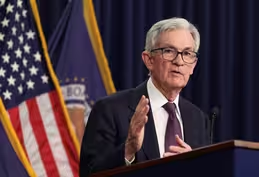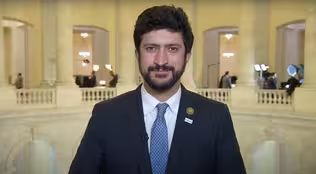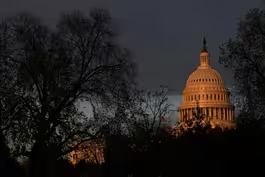
Why a promising treatment for alcohol abuse is barely used
Clip: 12/18/2024 | 10m 21sVideo has Closed Captions
Why a promising treatment for alcohol abuse is barely used
In our ongoing look at treating substance abuse in America, we turn to the most commonly used drug, and one of the deadliest: alcohol. Drinking kills more Americans every year than opioids or any other illegal drug. But promising treatments that could help people curb their drinking are barely being used. William Brangham reports.
Problems playing video? | Closed Captioning Feedback
Problems playing video? | Closed Captioning Feedback
Major corporate funding for the PBS News Hour is provided by BDO, BNSF, Consumer Cellular, American Cruise Lines, and Raymond James. Funding for the PBS NewsHour Weekend is provided by...

Why a promising treatment for alcohol abuse is barely used
Clip: 12/18/2024 | 10m 21sVideo has Closed Captions
In our ongoing look at treating substance abuse in America, we turn to the most commonly used drug, and one of the deadliest: alcohol. Drinking kills more Americans every year than opioids or any other illegal drug. But promising treatments that could help people curb their drinking are barely being used. William Brangham reports.
Problems playing video? | Closed Captioning Feedback
How to Watch PBS News Hour
PBS News Hour is available to stream on pbs.org and the free PBS App, available on iPhone, Apple TV, Android TV, Android smartphones, Amazon Fire TV, Amazon Fire Tablet, Roku, Samsung Smart TV, and Vizio.
Providing Support for PBS.org
Learn Moreabout PBS online sponsorshipGEOFF BENNETT: In our ongoing look at treating substance abuse in America, we turn now to the most commonly used drug and one of the deadliest, alcohol.
Drinking kills more Americans every year than opioids or any other illegal drug.
But, as William Brangham reports, promising treatments that could help people curb their drinking are barely being used.
CINDY FUNKA-LEA, Naltrexone Patient: Do you want a little salad dressing?
MAN: Sure.
WILLIAM BRANGHAM: Over the last few years, especially after she retired, Cindy Funka-Lea felt like she was drinking too much.
She said nobody else noticed, not her husband or their kids, but she did and she just couldn't stop.
CINDY FUNKA-LEA: Trying to dial it back on my own was really difficult.
I would go through this cycle.
So I would drink a little bit too much.
Then I would wake up with like, OK, fine, I'm not going to drink for a while.
So, that night, I wouldn't drink.
And then it's like two days later.
It's like, I can have a glass.
And it would just set things off again.
WILLIAM BRANGHAM: And you could never do just one?
CINDY FUNKA-LEA: I couldn't do just one.
It was really difficult to do just one.
I would -- one would make me want another one.
It's like a monkey on my back.
It's like I don't want to be thinking about this all the time.
WILLIAM BRANGHAM: One day, while driving near her home in Princeton, New Jersey... MAN: You must be 18 to 70 and want to reduce or stop your drinking.
WILLIAM BRANGHAM: ... she heard about a study at the University of Pennsylvania that was using a long-acting version of the drug naltrexone to help people curb their drinking.
CINDY FUNKA-LEA: And I'm like, are you kidding me?
Like, how come I have never heard of this medication before?
DR. HENRY KRANZLER, UPenn Perelman School of Medicine: Most of the practitioners still don't prescribe or perhaps don't even know about drugs like naltrexone.
WILLIAM BRANGHAM: Addiction psychiatrist Dr. Henry Kranzler was running that study.
DR. HENRY KRANZLER: She wanted to reduce her drinking.
She wanted to be able to drink -- quote -- "normally," meaning having one or two drinks, and stopping.
And that is a common complaint that people have, where there's a feed forward effect among many people who drink one or two drinks and then go on to drink five or six.
WILLIAM BRANGHAM: It's estimated that nearly 29 million Americans suffer from alcohol use disorder, but less than 2 percent receive medication to treat it.
Naltrexone is one of three drugs approved to help people manage their alcohol use.
It blocks the receptors in the body where alcohol attaches, so the pleasurable, rewarding sensations are reduced.
DR. HENRY KRANZLER: A good analogy is the accelerator and the brake in a car.
And if there is a strong accelerator effect and a weak brake effect, you end up drinking much more than you planned or much more than is good for you.
And so naltrexone can be thought of as something of a braking mechanism.
CINDY FUNKA-LEA: That advertisement on public radio was like, do you want to reduce your drinking?
I'm like, yes.
WILLIAM BRANGHAM: Funka-Lea signed up for the trial.
She got her first dose.
She wasn't told if it was naltrexone or a placebo, but says she knew immediately.
CINDY FUNKA-LEA: The very next day, made dinner and we opened a bottle of Prosecco and sat around.
I had a drink and I knew that I just felt different.
Now, all of a sudden, I'm focusing on the conversation with our friends and not thinking about, should I have another one?
Oh, I better not have another one.
Like, wow, I can't believe I'm not -- not white-knuckling anything.
I'm enjoying it.
This has to be a chemical, physical thing because I'm not thinking my way out of this.
I just feel really different.
WILLIAM BRANGHAM: From that day forward, her relationship with alcohol has totally changed.
When the trial ended, she got a daily prescription for naltrexone.
It costs $5 a month.
She's been on it for less than a year, still has the occasional drink or two, but says that monkey on her back is gone.
CINDY FUNKA-LEA: Cheers.
Yes, cheers.
WILLIAM BRANGHAM: Drinking alcohol has been linked to a huge number of health risks, including many cancers and heart and liver diseases.
In all, about 178,000 Americans are now dying every year from excessive drinking.
That's a nearly 30 percent spike since 2016.
DR. KATIE WITKIEWITZ, University of New Mexico: It's really tragic.
We have a medication that helps people, and less than 2 percent probably receive it who could really benefit from it.
WILLIAM BRANGHAM: Dr. Katie Witkiewitz is a psychiatrist at the University of New Mexico, and she runs an addiction center there.
She says lack of knowledge among doctors is partly to blame.
DR. KATIE WITKIEWITZ: There's two misconceptions among providers.
One is that providers believe they don't know how to treat substance use disorders, that they don't have the skills or the licensure needed to treat substance use disorders, which is not true, and they think abstinence is the only way, that Alcoholics Anonymous and Narcotics Anonymous is the only way.
And so providers will just refer their patients to those mutual help groups without even trying to tackle addiction in their office.
WILLIAM BRANGHAM: Witkiewitz argues this attitude not only harms patients, but it also hinders drug development.
She is part of a group that is petitioning the Food and Drug Administration to change its threshold for drug approval.
Right now, the FDA says a viable drug has to prevent any so-called heavy drinking days, which is more than four drinks a day for men and more than three for women.
DR. KATIE WITKIEWITZ: So, if you look at people coming into alcohol clinical trials looking for a medication, some of them are drinking upwards of 20 drinks a day.
I mean, we have people in our samples coming in, people in our studies who are drinking 60, 70 drinks a day.
WILLIAM BRANGHAM: Wow.
DR. KATIE WITKIEWITZ: Yes.
And so, for them, to reduce to five drinks or six drinks would be a huge success in my book.
But, according to the FDA, that would be a failure of a medication.
WILLIAM BRANGHAM: Naltrexone is not a cure-all.
It doesn't work for everyone.
And a range of studies have demonstrated mixed results on its effectiveness.
DR. HENRY KRANZLER: It's not like a drug that works for everybody.
It clearly does not.
And that's why we need more drugs.
WILLIAM BRANGHAM: But for 74 year-old Stephen Harbin, it did work.
What did alcohol do to your life when you look back on it today?
STEPHEN HARBIN, Naltrexone Patient: Well, it eventually destroyed it.
WILLIAM BRANGHAM: Though it took him decades to admit it, Harbin is an alcoholic.
He suffered from depression his entire life and drank heavily for close to 50 years.
At his worst, he said it could be 40 to 45 drinks a day.
Over the years, his wife urged him repeatedly to get help, but nothing he tried, therapy, Alcoholics Anonymous, none of it worked.
And then his wife simply had enough.
STEPHEN HARBIN: When she left me again, I just started drinking even more, which is hard to believe.
If I was awake, I drank.
And I just said I think I don't want to do this anymore.
And I got my gun out.
I loaded it.
and I took it, and I fired into the wall.
And that's when I decided, OK, I need help.
DR. SNEHAL BHATT, University of New Mexico: Now you are feeling more emotions, right, kind of having more of that -- those changes, dealing with them, coping with them.
WILLIAM BRANGHAM: Harbin went to an addiction clinic run by Dr. Snehal Bhatt, who is the head of addiction psychiatry at the University of New Mexico Medical School.
STEPHEN HARBIN: The things that used to trigger urges no longer affect me.
WILLIAM BRANGHAM: In addition to psychological counseling, Dr. Bhatt also started Harbin on a long-acting form of naltrexone called Vivitrol to dial back his craving for alcohol.
He's now been on it for four years.
DR. SNEHAL BHATT: We know from decades of science in both animals and humans that cravings are one of the biggest reasons why people go back to using a substance.
And this medication suppresses it.
And, secondarily, if I do drink while I'm on it, I don't get as much of a buzz.
I don't get as much of a reinforcement.
STEPHEN HARBIN: I just never think about liquor at all.
WILLIAM BRANGHAM: Is that right?
STEPHEN HARBIN: I don't.
I don't have any urges.
The things that used to trigger me, which I can't even begin to remember what they were -- I did not have a drink from that day forward.
DR. SNEHAL BHATT: We have these effective interventions, but they're not prescribed, right, at nearly the rate I would like to see.
And then the last piece, I wonder, is this siloing that we have in our medical system culturally, where substance use disorders are something else, right?
They are maybe moral weaknesses.
They are maybe things for criminal justice to deal with, but they're not medical problems.
WILLIAM BRANGHAM: Harbin says he's grateful to have finally found something that helped him get sober.
But this time is bittersweet.
His decades of alcoholism drove everyone he loved away.
STEPHEN HARBIN: You know, I have been sober now for four years, but I don't have anybody to share it with.
I have estranged everybody that was in my life.
CINDY FUNKA-LEA: I want to be in control and be able to enjoy having a toast.
WILLIAM BRANGHAM: Cindy Funka-Lea is grateful she randomly learned about naltrexone at this point in her life.
She recently completed a half-marathon and went on vacation to Italy.
She says, because her drinking isn't always in the back of her mind, she has never felt more present.
CINDY FUNKA-LEA: I could just enjoy my friends, family, the vacation, and it just not be there in my head all the time.
And just that waking up clear-headed, oh, my God, it's wonderful.
I just feel like I have a lot of my life back.
It's very exciting.
WILLIAM BRANGHAM: For the "PBS News Hour," I'm William Brangham.
Fed lowers interest rates again but future cuts in question
Video has Closed Captions
Clip: 12/18/2024 | 5m 34s | Fed lowers interest rates again but inflation concerns make future cuts uncertain (5m 34s)
Rep. Casar on progressive caucus effort to rebrand Democrats
Video has Closed Captions
Clip: 12/18/2024 | 6m 15s | Rep. Greg Casar outlines progressive caucus efforts to rebrand Democratic Party (6m 15s)
Syrians attempt to uncover fate of Assad's prisoners
Video has Closed Captions
Clip: 12/18/2024 | 3m 36s | Syrians attempt to uncover fate of thousands detained and feared murdered under Assad (3m 36s)
Syrians face horrors at site of Assad's chemical attack
Video has Closed Captions
Clip: 12/18/2024 | 8m 34s | Amid new freedoms, Syrians face horrors at site of Assad's 2013 chemical weapons attack (8m 34s)
Trump tells GOP to reject government funding bill
Video has Closed Captions
Clip: 12/18/2024 | 5m 56s | Trump tells GOP to reject funding bill that would avoid a government shutdown (5m 56s)
U.S. astronauts stranded in space face another delay
Video has Closed Captions
Clip: 12/18/2024 | 6m 10s | U.S. astronauts stranded in space face another delay before they can return to Earth (6m 10s)
Providing Support for PBS.org
Learn Moreabout PBS online sponsorship
- News and Public Affairs

FRONTLINE is investigative journalism that questions, explains and changes our world.

- News and Public Affairs

Amanpour and Company features conversations with leaders and decision makers.












Support for PBS provided by:
Major corporate funding for the PBS News Hour is provided by BDO, BNSF, Consumer Cellular, American Cruise Lines, and Raymond James. Funding for the PBS NewsHour Weekend is provided by...





